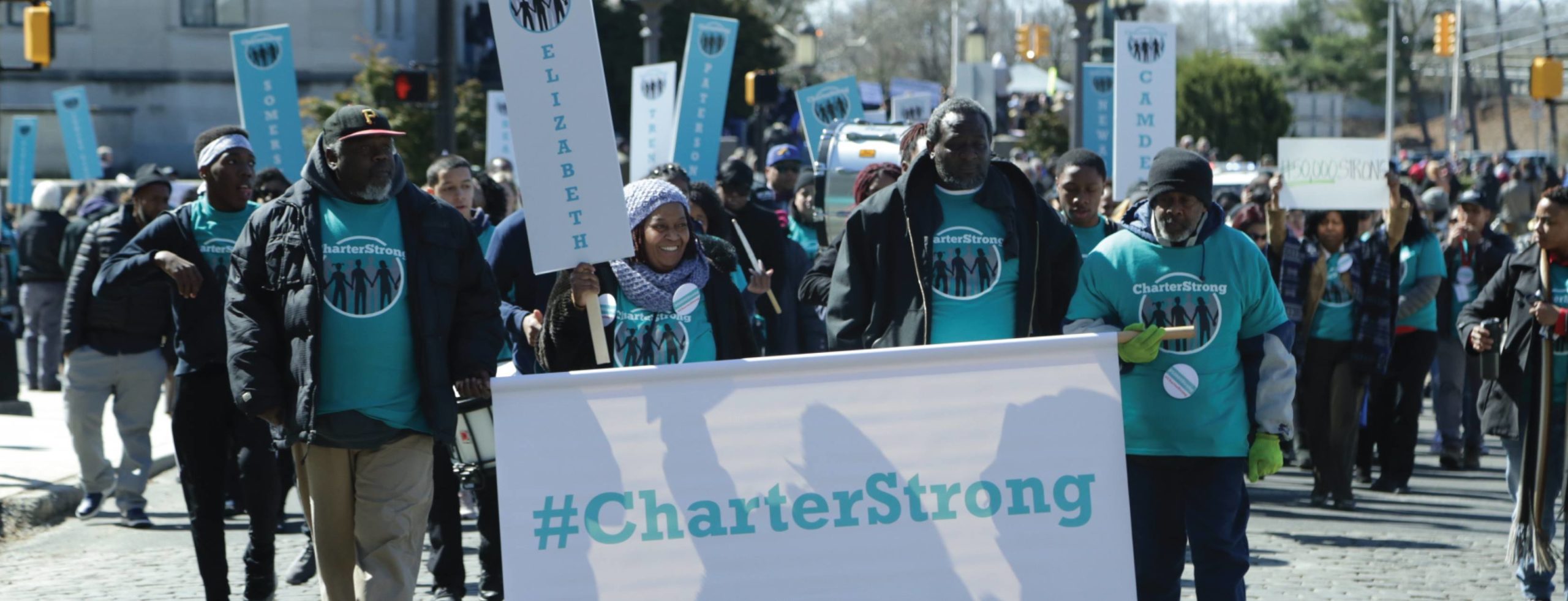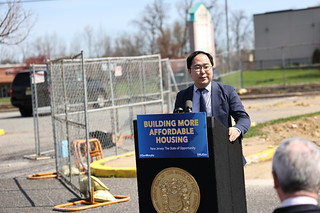
We Need To Talk About Race When We Talk About New Jersey Charter Schools.
December 3, 2018
Has the NJ Department of Education Misallocated Federal Funds Intended for Low-Income Students?
December 7, 2018You Want An Authentic Charter School Review? New Jersey Has One Now! Parents Brave the Cold To Speak Truth to Comm. Repollet
Yesterday I stood outside State Department of Education in Trenton and watched dozens of parents deliver 2,000 postcards, carefully stacked in boxes, each pleading with DOE Commissioner Lamont Repollet to end the charter school moratorium. One by one, on frigid Riverside Plaza, parents approached the microphone and voiced support for public school choice in New Jersey. “Parents are standing strong, and we have a clear message for our leaders: we love our public charter schools and our children deserve to be treated fairly, just like other public school students,” said parent Ashley Campbell from Paterson.
After the parents concluded, Harry Lee, Interim President of the New Jersey Charter School Association (NJCSA), announced the release of a new report called “Charter Schools in New Jersey: A Landscape Report.”
There’s much to unpack here. Let’s start with the parents and their extraordinary response to the DOE’s Charter School Program Act Review, which is either a stylized stalling tactic choreographed to fulfill Gov. Murphy’s promise to lobbying groups to take a “pause” on charter expansion or an authentic attempt to improve NJ’s 23-year-old charter school law. Jury’s out on that one (although let’s note that no charters were approved and the process was subverted in last March’s authorization round and no applications were submitted by the most recent deadline. Reasoned potential applicants, why bother?).
Back to the robust support by parents. To wit,
- More than 1,000 public charter school parents, teachers, and supporters turned out to charter review events in Newark, Paterson, Trenton, Jersey City, Atlantic City, Camden, and Plainfield. Comm. Repollet attended many of these events and also toured 11 charter schools throughout the state and saw firsthand how charter schools are changing lives.
- On October 16th, during the first community meeting in Paterson, more than 200 charter parents and supporters turned out and lined the hallways (there weren’t enough seats) to provide input to the DOE about why they love their charter schools.
- On November 1, more than 350 Jersey City charter school parents, students, educators and supporters marched from BelovED community charter school to the Jerry Walker Center to raise their voices for fair funding for charter schools in Jersey City.
- On social media, 1 million New Jersey residents were reached with stories about how charter schools are changing lives.
In short, parents in these urban centers, mostly low-income and of color, demand that Gov. Murphy and Comm. Repollet prioritize children’s academic needs over politics and end the moratorium demanded by NJ’s teacher union leaders. As one parent said, “a child is only five years old once, only fifteen years old once.” Comm. Repollet received their feedback graciously.
The NJCSA report is worth a full read. (It’s not that long.) Here are two takeaways: First, the DOE’s outreach process for the charter law review unintentionally infused NJ’s growing contingent of parent charter advocates with renewed determination to increase the state’s charter school sector, currently stuck at 50,000 students. Second, NJ’s charter schools clearly offer public academic opportunities to students who would otherwise be relegated to low-performing district schools. (In NJ, housing in high-performing districts comes bundled with granite countertops and access to good schools.)
I’ll note a remarkable contrast between the information offered to participants during the Charter School Act Review — a data-devoid information packet consisting of a powerpoint and FAQ sheet, as well as four vapid questions to answer (see here for a charter school parent’s take on the Review’s shortcomings) — and the data-driven NJCSA report.
The Charter Act Review is so DOE or, more fairly, so bureaucratic, with a total focus on input and a total disregard for output, or student academic growth.
The NJCSA’s report is all about output, all about how a well-regulated public charter sector helps children succeed. Thus, it describes in detail (with appendices in the back) the opportunities available to families through alternatives to traditional district schools. For example, a “ a rigorous, independent analysis of the achievement results” of NJ charters found that “students on average gained an additional two months of learning per year in reading and an additional three months of learning per year in math compared to their district school counterparts.” In addition, “results confirm that New Jersey charter school leaders and teachers show a commitment to addressing the needs of Black and Hispanic students in poverty.”
And there’s this:
In Newark, the second highest performing charter sector in the nation, charter school students have made extraordinary progress and outperformed the state average on PARCC for the first time in 2018.
Let’s hand it to NJCSA: they actually answered those four questions, which suddenly don’t seem so vapid when respondents have the facts. Here are a few (very condensed) highlights.
Question #1: What do you like about New Jersey’s approach to charter schools? Why?
NJCSA applauds the DOE’s commitment to high-quality school choice that serves all students, including those with disabilities and English Language Learners. Charters are the most highly accountable schools in the state. a strength of our charter authorization system. From the report:
Charter schools that are failing students are closed, the ultimately form of accountability. Since 2010, 24 charter schools have been closed. If traditional districts were measured against the standards within the Performance Framework, dozens of struggling districts would likely be forced to close due to these higher expectations. QSAC reviews, the accountability system used for school districts, are conducted every three years, and are largely focused on inputs/compliance with 9 limited consequences. Many districts would be forced to close and not have the privilege of serving children if they were held to the same standards as charter schools.
Question 2: What would you like to improve regarding New Jersey’s approach to charter schools? Why?
Here we get to the heart of the problem: charter schools are badly underfunded compared to district schools. From the report:
On average, public charter school students receive only 73 cents on the dollar compared to traditional public school students. In some districts, a charter school may receive less than 50% of the aid the district receives for a student. Charter school students are public school students and should be treated equally.
In addition, charters get no facilities funding in NJ, an inequity noted by the National Alliance of Public Charter Schools (which ranks New Jersey’s charter law as 33rd out of 45 charter laws in the country). From the report:
Charter schools do not have equitable access to capital funding and facilities in New Jersey, and finding viable facilities is a challenge for most charter schools. Charter schools receive $0 for facilities funding, while traditional districts receive millions of dollars per year in debt service aid and access to free buildings. On average, charter schools in New Jersey spend about $1,500 per student from designated per-pupil funding/operating revenue each year on facilities costs, which takes away money that could be spent in the classroom. Providing equitable access to capital funding and facilities would remedy one of the greatest challenges to increasing the number of 10 great public charter schools in the state – a suitable building to provide students with a high quality public education
And, critically, NJ has only one charter authorizer, the DOE Commissioner, which leads to politicking over student needs (e.g., the last round when no charters were approved).
From the report:
The lack of multiple authorizing options is a challenge to high-quality charter school growth in New Jersey. There should be at least one more type of authorizer in New Jersey that is aligned to national best practices in charter school authorizing.
Finally, NJCSA recommends that the DOE be more transparent about the performance of charter schools, the high degree of oversight, and the application process.
Question 3: Are there adjustments the State can make to its approach to charter schools in order to better serve students and communities?
Short answer: yes! Start with fair funding, says NJCSA , and — this is critical — stop using traditional districts as middlemen in distributing state funding, a system that foments unnecessary resentment. Instead, have the state give funding directly to charters.
In addition, NJCSA pleads for facilities funding in order to keep the money in the classroom, a mandate that charters get right of first refusal when districts sell empty school buildings, and new regulations that allow charter schools to access state facility funding programs that are available to all other public schools.
Question 4: In what ways can district schools and charter schools work together to improve educational, operational, and social outcomes?
There are many ways, as some charters demonstrate already by offering professional development opportunities to teachers in traditional schools and sharing best practices. NJCSA would like to see the DOE offer grants to encourage this sort of partnership, include charters in district accountability ratings, create funding set-asides for school districts and charter schools to partner to turn around the lowest-performing district schools, and encourage universal enrollment systems like those in Newark and Camden.
Finally, NJCSA has some suggestions for the next steps the DOE should take in order to provide an authentic, data-driven evaluation of our charter school sector and necessary legislative changes. But for that to happen,
It is critical that this review of charter schools does not devolve into a polarizing debate steeped in myths and distrust; rather, policymakers must take a deep look into the data (academic, financial, and operational) to determine what is working and not working in charter schools and how to change policies to increase access to high quality public schools throughout New Jersey. Moreover, the Department should leverage lessons learned and best practices from our colleagues from across the country to ensure a strong and thriving charter sector that meets the needs of its students and communities.
How do we defuse this “polarizing debate”? Through relying on “a comprehensive evaluation of charter school performance,” compiling “a data-driven report” to “supplement” results from the data-empty Charter School Law Review and studying best practices throughout the country.
Comm. Repollet, listen to the parents you greeted so warmly yesterday. They’re living it. The lobbyists on State Street are not. Can’t you review the Charter School Law while continuing to authorize new charters that parents so desperately need? Surely you know that it will take ages for the Legislature to approve any amendments — they’ve entertained multiple proposals over the last decade with zero results. This hostage situation isn’t working.
But you don’t have to listen to me. Just read a few postcards.







6 Comments
[…] HERE for the full story from NJ Left […]
[…] interferes with public school choice primarily for low-income children through an interminable charter school “review,” apparently lost in the bowels of the DOE, and squanders our tax […]
[…] night. Worth noting: At last year’s convention, the NJ Department of Education announced its “Charter School Act Review,” which, as of yet, has produced no results. (Can we chew gum and walk at the same time? […]
[…] on new charter school authorizations (despite the 36,000 students on wait lists) by conducting a “Charter School Act Review.” This was supposed to culminate with a report that has never been issued. (If you click on […]
[…] Department of Education, when faced complex issues, punts instead. We’ve seen this with the moribund “Charter School Act Review,” which promised clear guidance on charter school expansions and approvals; the report was never […]
[…] of Education wouldn’t have wasted two years of everyone’s time on a now-moribund “Charter School Act Review” that, on the DOE’s website, now leads the public to an error […]